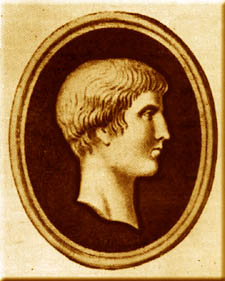
An epigram is a brief, interesting, memorable, and sometimes surprising or satirical statement. The word is derived from the Greek: ἐπίγραμμα epigramma "inscription" from ἐπιγράφειν epigraphein "to write on, to inscribe", and the literary device has been employed for over two millennia.
Callimachus was a native of the Greek colony of Cyrene, Libya. He was a poet, critic and scholar at the Library of Alexandria and enjoyed the patronage of the Egyptian–Greek Pharaohs Ptolemy II Philadelphus and Ptolemy III Euergetes. Although he was never made chief librarian, he was responsible for producing a bibliographic survey based upon the contents of the Library. This, his Pinakes, 120 volumes long, provided the foundation for later work on the history of ancient Greek literature. He is among the most productive and influential scholar-poets of the Hellenistic age.

Marcus Valerius Martialis was a Roman poet from Hispania best known for his twelve books of Epigrams, published in Rome between AD 86 and 103, during the reigns of the emperors Domitian, Nerva and Trajan. In these short, witty poems he cheerfully satirises city life and the scandalous activities of his acquaintances, and romanticises his provincial upbringing. He wrote a total of 1,561 epigrams, of which 1,235 are in elegiac couplets.
Maximus Planudes was a Byzantine Greek monk, scholar, anthologist, translator, mathematician, grammarian and theologian at Constantinople. Through his translations from Latin into Greek and from Greek into Latin he brought the Greek East and the Latin West into closer contact with one another. He is now best known as a compiler of the Greek Anthology.
Lucilius Junior, was the procurator of Sicily during the reign of Nero, a friend and correspondent of Seneca, and the possible author of Aetna, a poem that survives in a corrupt state.

The gens Lucilia was a plebeian family at ancient Rome. The most famous of the gens was the poet Gaius Lucilius, who flourished during the latter part of the second century BC. Although many Lucilii appear in Roman history, none of them obtained any of the higher offices of the Roman state.
Titus Albucius was a noted orator of the late Roman Republic.
Gaius Lucilius, the earliest Roman satirist, of whose writings only fragments remain, was a Roman citizen of the equestrian class, born at Suessa Aurunca in Campania. He was a member of the Scipionic Circle.

Meleager of Gadara was a poet and collector of epigrams. He wrote some satirical prose, now lost, and he wrote some sensual poetry, of which 134 epigrams survive. He also compiled numerous epigrams from diverse poets in an anthology known as the Garland, and although this does not survive, it is the original basis for the Greek Anthology.

Serpent of the Nile is a 1953 Technicolor historical adventure film produced by Sam Katzman and directed by William Castle. The film starred Rhonda Fleming, Raymond Burr, William Lundigan and Michael Ansara. In an early role, actress Julie Newmar appears as an exotic dancer clad only in gold paint.
Asclepiades of Samos (Sicelidas) was an ancient Greek epigrammatist and lyric poet who flourished around 270 BC. He was a friend of Hedylus and possibly of Theocritus. He may have been honoured by the city of Histiaea in about 263 BC.
Crinagoras of Mytilene, also known as Crinogoras, sometimes spelt as Krinagorasis or Krinagoras was a Greek epigrammatist and ambassador, who lived in Rome as a court poet.

The Epistulae Morales ad Lucilium, also known as the Moral Epistles and Letters from a Stoic, is a collection of 124 letters that Seneca the Younger wrote at the end of his life, during his retirement, after he had worked for the Emperor Nero for more than ten years. They are addressed to Lucilius, the then procurator of Sicily, who is known only through Seneca's writings. Regardless of how Seneca and Lucilius actually corresponded, it is clear that Seneca crafted the letters with a broad readership in mind.
The Satires is a collection of satirical poems written by the Roman poet, Horace. Composed in dactylic hexameters, the Satires explore the secrets of human happiness and literary perfection. Published probably in 35 BCE and at the latest, by 33 BCE, the first book of Satires represents Horace's first published work. It established him as one of the great poetic talents of the Augustan Age. The second book was published in 30 BCE as a sequel.
Quintus Lucilius Balbus was a Stoic philosopher and a pupil of Panaetius.
Philippus of Thessalonica or Philippus Epigrammaticus was the compiler of an Anthology of Epigrammatists subsequent to Meleager of Gadara and is himself the author of 72 epigrams in the Greek Anthology. Philippus has one word which describes the epigram by a single quality; he calls his work an oligostikhia or collection of poems not exceeding a few lines in length. Philippus' own epigrams, of which over seventy are extant, are generally rather dull, chiefly school exercises, and, in the phrase of Jacobs, imitatione magis quam inventione conspicua. But we owe to him the preservation of a large mass of work belonging to the Roman period.
Metrodorus was a Greek grammarian and mathematician, who collected mathematical epigrams which appear in the Greek Anthology.
Eighteen Epigrams are attributed to Plato, most of them considered spurious. These are short poems suitable for dedicatory purposes written in the form of elegiac couplets.

La Rivolta dei Pretoriani is a 1964 sword and sandal film about the conspiracy to assassinate the emperor Domitian in the year AD 96, though the historical facts have been heavily fictionized. This film was written by Gian Paolo Callegari, directed by Alfonso Brescia and starred Richard Harrison.










